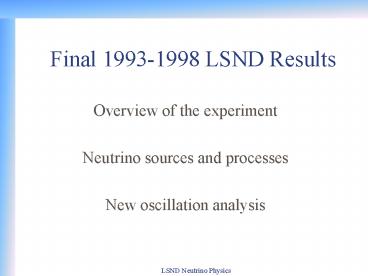Final 19931998 LSND Results - PowerPoint PPT Presentation
1 / 29
Title:
Final 19931998 LSND Results
Description:
Final 19931998 LSND Results – PowerPoint PPT presentation
Number of Views:20
Avg rating:3.0/5.0
Title: Final 19931998 LSND Results
1
Final 1993-1998 LSND Results
- Overview of the experiment
- Neutrino sources and processes
- New oscillation analysis
2
The LSND Experiment
nm,?nm, ne, (?ne )
Target
800 MeV protons 1 mA 6 duty ratio
CH2
Cu Beam Dump
L 30 meters
167 tons CH2 1220 PMTs Active Veto Shield
Neutrino Targets in CH2 nm, ne
neutrons in 12C electrons ?nm, ,?ne
protons in 12C electrons free protons
3
Neutrino Fluxes
4
LSND Neutrino Physics
- n interactions on 12C, e, p 20-300 MeV
- Oscillation Search
5
Event Time Structure
6
Global Fit Parameters
7
Fit Results (94-98)
8
(No Transcript)
9
Oscillation Analysis Strategy
- Search for?nm ? ?ne decay at rest oscillation
events in the energy range 20-60 MeV - Search for nm ? ne decay in flight oscillation
events in the energy range 20-200 MeV - Use common a primary-event electron selection
across all neutrino processes - Simultaneously fit all neutrino processes to
constrain fluxes and backgrounds - Identify 20-60 MeV electron events with
correlated neutron capture ? (?ne p? en ) with
correlated neutron capture gamma (Rg gt 10) - Fit 20-200 MeV oscillation signal in
(E,R,L,cosqn) to determine best oscillation
parameter values
10
Analysis Improvements
- Global fit to all neutrino processes in order to
constrain backgrounds - Improved position resolution that gives better
accidental gamma rejection in decay-at-rest
analysis - Correlated gamma efficiency improves from 23 to
40 - Accidental background efficiency drops from 0.6
to 0.23 - Combined decay-at-rest decay-in-flight
treatment when determining oscillation parameters
11
Neutrino Oscillations 20-60 MeV
- Rgt10 Selection
- on off ? bkgd excess
- 83 (-)33.7 (-)16.6 32.79.2
- Fit to R distribution
- Oscillation Excess Oscillation Probability
- 83.3 21.2 (0.250.06 0.04)
12
Global Oscillation Fit
- Electron selection in energy range of 20-200 MeV
- Fit all backgrounds in (Ee, R?, L?, cos??) and
calculate likelihood at each (Dm2,sin2q)
13
Summary
- LSND observes excess ?ne p? en events which are
not consistent with conventional neutrino
processes - A natural explanation is neutrino appearance due
to flavor oscillations that have an overall
probability of (0.250.060.04) with a Dm2 gt 0.2
eV2 - This is the only appearance evidence of neutrino
oscillations at the present time
14
(No Transcript)
15
Fluxes determined from known reactions
16
Neutrino Sources
Positive decay chain (88)
Negative decay chain (12)
- All stopped ?- are absorbed
- 88 of stopped m- are captured
17
Neutrino Oscillation Search
- Event Selection
- Electron-like events 20-200 MeV
- Distance to PMT surface gt 35 cm
- No prior detector activities within 12 ?s
18
Global Fit Parameters
Cross section parameters(6)
19
Global Fit Parameters (cont.)
Neutrino flux related parameters(3)
20
Global Fit Parameters (cont.)
Detection/selection efficiency related
parameters(4)
- ? efficiency
- e efficiency
- ? efficiency
- ? efficiency
21
n 12C Interactions
excited states
excited states
ground state
ground state
12N
12B
17.344 MeV
13.370 MeV
12C
22
?nm,e p Interactions
- Cross section determined accurately from neutron
lifetime - ?nm p rate constrains number of p- decays
23
Global fit to neutrino data
- All neutrino processes included in fit
- Cross sections allowed to vary around theoretical
values - Neutrino fluxes allowed to vary within errors
- Detection efficiencies allowed to vary
24
Fit Results
25
Fit Results(cont.)
26
Fit Results(cont.)
27
Fit Results (Cont.)
28
Neutrino Processes
1. Neutrino-nucleus interactions
2. Neutrino-electron interactions
3. Neutrino-proton interactions
29
Neutrino Fluxes at LSND
- 1mA 800 MeV protons on H2O or tungsten
- pp- production is 81
- 2 meter decay distance to Cu beam stop so that
3(5) of p(p-) decay in flight to produce high
energy neutrinos - 95 of p and m decay at rest
- 0.6 of m- decay at rest































